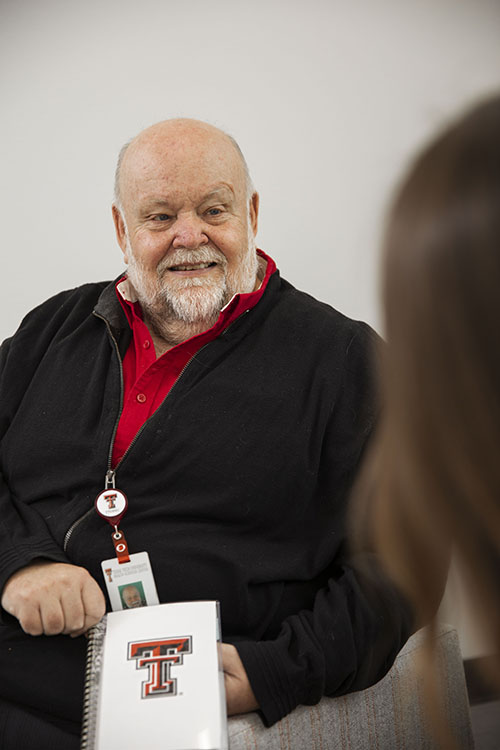The Intersection of Physical and Mental Health
Physical and mental health impact one another in numerous ways

The mind and the body are often viewed as separate entities. But research continues to show that the two are closely related. Good mental health can have a positive impact on physical health. Conversely, poor mental health can negatively affect physical health.
We spoke with Associate Professor Dave Schroeder, Ph.D, about the intersection of physical and mental health. Schroeder is the clinical coordinator and former director of the TTUHSC School of Health Professions Master of Science in Clinical Mental Health Counseling Program. He is a licensed professional counselor in Texas and Michigan and a certified rehabilitation counselor.
The History of Mental Health vs. Physical Health
“As far back as we’ve recorded the history of health care, mental health has been treated distinctly and differently and usually with some disdain,” Schroeder begins. “People have been reluctant to seek help for mental health issues.”
It has been an approximately 20 year movement to include mental health as a holistic view of healthcare. Schroeder points out all of the times we’ve seen a physician for illness only to have the doctor report that “nothing is wrong.” How you feel mentally and spiritually is becoming as important as lab tests.
Schroeder remembers a personal bout of cancer from 15 years ago.
“I made an appointment with an oncologist and a therapist. Around me were mental health practitioners who couldn’t believe how upbeat and calm I was during the process, but I was confident I would survive. I know it’s because I took care of the mental side of things, “he says.
Schroeder states that it’s only been in the last 10 years that we’ve seen true parity in the importance of mental and physical health.
“Prior to that, you had to go through a screening process to decide whether or not you could get those [mental health] services,” he says. “They wanted you to be suicidal or self injurious before they’d let you see a therapist.”
The Affordable Care Act has changed things for the better, making mental healthcare more attainable for all.
Cause and Effect: How the Mental affects the Physical

“We like to think of them as distinct things,” Schroeder says of mental and physical health. But we are recognizing more and more that we are one being.
“When one part of you isn’t doing well, it affects the rest of how you’re functioning,” he says.
Schroeder points out that a person can be in pristine physical condition but not functioning well in the world, just as someone could be physically quite ill and seemingly well mentally.
“Most studies out there today will show that if you can address the whole person, the holistic approach, people have better outcomes,” he explains.
This has led to changes in how we treat patients all the way down to hospital visitation. We now recognize the positive impact of allowing support around the patient.
“It’s rare now that you’re at the hospital by yourself,” Schroeder notes. “Thirty years ago, there was a narrow window of visitation and a patient was in the hospital the majority of the day by themselves.”
“We now know through lots of research that a large proportion of the mundane health issues in America are stress related,” he continues. “How people are coping with stress and reacting to their environment are stress reactions.”
These reactions can have a negative effect on physical health and continue the cycle of stress. Coping strategies such as overeating, smoking or substance abuse are a reaction to mental stress. Conversely, physical exercise improves mental health and makes coping with one’s environment easier.
Physicians are now aware of these connections and are becoming better informed and equipped to treat the whole patient.
“If you show signs of an ulcer, physicians might now talk to you about the stress in your life because it all ties together,” Schroeder says.
Other conditions related to stress include hypertension and diabetes, conditions often caused and exacerbated by our response to stress.
The Importance of Empathy
When we talk about the intersection between mental and physical health, Schroeder encourages us to remember that everyone has their issues that they are contending with.
“Instead of demonizing them or seeing these issues as a weakness, let’s recognize that they are signs that we need to try something different,” he says. “If you start to feel really stressed, you have options.”
These include exercise, one-on-one therapy and group therapy. And he stresses that reaching out for help is not a sign of weakness. In fact, it’s the opposite.
Schroeder is an advocate for a holistic approach to healthcare and looks toward a day where mental health is treated with the same urgency and care as physical health. And as we continue to adjust to a post-COVID world, the impact the pandemic will have on our mental health is just coming into focus. A study by Johns Hopkins found that the consequences of COVID on mental and behavioral health are as traumatic as the physical toll, with an increase in suicide, interpersonal violence and substance abuse.
Schroeder points to the AIDS epidemic as an example of how damaging a lack of empathy can be. The combination of ignorance and fear caused many people to look for a way to blame, suggesting the disease was a deserved result of behavioral choices.
The need to place blame on the individual is harmful to recovery and health. Only by showing empathy to our patients and ourselves will we be able to successfully treat and improve the physical and mental health of ourselves and patients.
Related Stories
The John Wayne Cancer Foundation Surgical Oncology Fellowship Program at Texas Tech University Health Sciences Center Announced
TTUHSC is collaborating with the John Wayne Cancer Foundation and has established the Big Cure Endowment, which supports the university’s efforts to reduce cancer incidence and increase survivability of people in rural and underserved areas.
Making Mental Health a Priority in the New Year
Sarah Mallard Wakefield, M.D., a psychiatrist with Texas Tech Physicians, talks about strategies to combat widespread and growing anxiety.
TTUHSC Dean to be Inducted into the National Academies of Practice as Distinguished Fellow
Gerard E. Carrino, Ph.D., MPH, dean of the TTUHSC Julia Jones Matthews School of Population and Public Health, will be inducted into the National Academies of Practice (NAP) as a Distinguished Fellow of the Public Health Academy.
Recent Stories
National Academy of Inventors Names TTUHSC Faculty Senior Members
The National Academy of Inventors (NAI) has designated two current and one former TTUHSC faculty researchers as Senior Members.
The John Wayne Cancer Foundation Surgical Oncology Fellowship Program at Texas Tech University Health Sciences Center Announced
TTUHSC is collaborating with the John Wayne Cancer Foundation and has established the Big Cure Endowment, which supports the university’s efforts to reduce cancer incidence and increase survivability of people in rural and underserved areas.
TTUHSC Receives $1 Million Gift from Amarillo National Bank to Expand and Enhance Pediatric Care in the Panhandle
TTUHSC School of Medicine leaders accepted a $1 million philanthropic gift from Amarillo National Bank on Tuesday (Feb. 10), marking a transformational investment in pediatric care for the Texas Panhandle.
